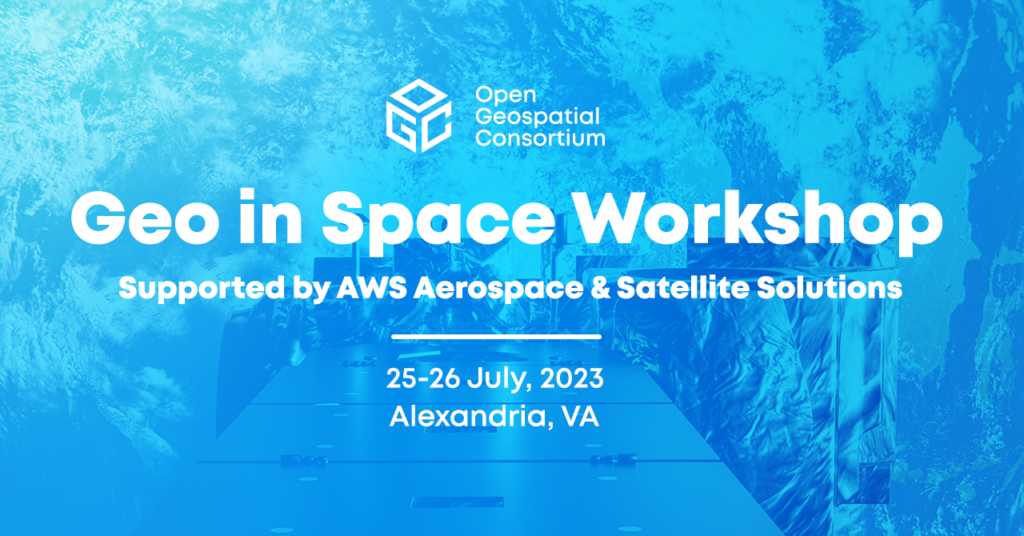HYBRID MEETING
July 25, 2023 9:00 am — July 26, 2023 5:00 pm
Alexandria, VA

Event supported by Amazon Web Services
As we move into the commercialization of space and consider federated constellations of satellites, along with integration of entity communications, a need for architectures and open standards arise. While the government and military have been working with industry to create communication architectures there are still gaps and missing standards especially in certain arenas such as Federated constellations, and international participation and acceptance of new standards.
OGC, as the leader in Geospatial tech, standards, and innovation and the largest formal consortium of expert organizations in geospatial, is perfectly positioned to bring our collective expertise in geospatial to accelerate the development of interoperable technologies and open standards for space. In this workshop, OGC, supported by AWS Space and Satellite Solutions division, is bringing space and geospatial stakeholders together to understand current status, gaps and disparities, and interoperability requirements. The outcomes of this workshop help incorporate existing and emerging geospatial computing into standards, tools, and pilots impacting space domain awareness and space traffic management, tracking, and optimization of space resources.
What capabilities exist, and are needed to enable Mapping, Charting, and Geodesy for the Moon and Mars at the same level of accuracy and fidelity as we provide for the Earth?
How can we support the planning, construction, maintenance, and decommissioning of manned infrastructure on the Moon and Mars? Are there additional capabilities to enable accurate navigation across the surface of the Moon and Mars that should be considered?
What tools does the space community need to better enable Space Situational Awareness using Space-based assets?
Are there capabilities needed to calculate the current, past, and future locations of a Space object based on gravitational fields, Space weather, and object velocity?
Are there additional capabilities needs to support accurate interplanetary navigation?
What laws should be considered when governing Space activities?
Does the space community wish to implement an AIS-like system?
Do organizations require capabilities to enable the identification, tracking, and rendezvous of one Space object by another.
Are non-Terrestrial communications desired?
The status of space architecture
Federated system geospatial data needs
Commercialization of Space Needs
Open Standards Needs
Additional considerations
Tuesday, 25 July
| Start | End | Organization | Speaker – Title |
| 8:30 AM | 9:00 AM | Coffee | |
| 9:00 AM | 10:00 AM | Welcome | |
| 9:00 AM | 9:10 AM | OGC | Marge Cole |
| 9:10 AM | 9:20 AM | NGA | Jackie Carr |
| 9:20 AM | 9:30 AM | AWS | Mark Korver |
| 9:30 AM | 10:00 AM | Objectives & Testbed-18 Outcomes | |
| 9:30 AM | 9:45 AM | Objectives | Marge Cole |
| 9:45 AM | 10:00 AM | Testbed-18 Outcomes | Chuck Heazel |
| 10:00 AM | 10:15 AM | Break | |
| 10:15 AM | 12:00 PM | Non-Terrestrial Communications | |
| 10:15 AM | 10:45 AM | NASA, AIST, JPL | Ben Smith – New Observing Strateigies Program |
| 10:45 AM | 11:00 AM | NASA JPL | Thomas Huang – Open Source Software Applications and Usage |
| 11:00 AM | 11:15 AM | NASA JPL | Nga Chung – Apache Science Data Analytics Platform (SDAP) technology |
| 11:15 AM | 11:45 AM | SpaceRake | Jordan Wachs – Streamlining data from space laser comms |
| 11:45 AM | 12:00 PM | Q&A | |
| 12:00 PM | 1:00 PM | Lunch | |
| 1:00 PM | 2:30 PM | Accurate Interplanetary Navigation and On-Orbit Compute and Use Case Support | |
| 1:00 PM | 1:30 PM | AWS Aerospace & Satellite Solutions | Mark Korver – On-Orbit Compute and Use Case Support |
| 1:30 PM | 2:00 PM | EOI Space | Ben Tuttle – On-Orbit Smart Tasking and Technology |
| 2:00 PM | 2:30 PM | HawkEye 360 | Tim Pavlick – Small Sat Ecosystem Analysis / Enterprise Use of AI |
| 2:30 PM | 3:00 PM | Break | |
| 3:00 PM | 5:00 PM | Mapping, Charting, and Geodesy for the Moon and Mars | |
| 3:00 PM | 3:30 PM | USGS | Jay Laura – Planetary Spatial Data Infrastructure |
| 3:30 PM | 4:00 PM | NGA | Nick Makley – Lunar Geodetic System Overview |
| 4:00 PM | 4:30 PM | USGS | Sarah Black, Marc Hunter – Live Mapping and GIS – Planetary |
| 4:30 PM | 5:00 PM | Q&A |
5:00PM – 7:00PM: Reception
Wednesday, 26 July
| Start | End | Organization | Speaker – Title |
| 9:00 AM | 9:30 AM | Coffee | |
| 9:30 AM | 10:30 AM | Enterprise Use of AI | |
| 9:30AM | 10:00AM | SmallSat Alliance | Steve Nixon – SmallSats |
| 10:00 AM | 10:30 AM | HawkEye 360 | Tim Pavlick – Enterprise Use of AI |
| 10:30 AM | 12:00 PM | Space Activities and the Law | |
| 10:30 AM | 11:00 AM | Womble, Bond, Dickinson, LLP | David Vance Lucas – |
| 11:00 AM | 11:30 AM | Williams Mullen | Kevin Pomfret – Technology ventures and equity transactions |
| 11:30 AM | 12:00 PM | Q&A | |
| 12:00 PM | 1:00 PM | Lunch | |
| 1:00 PM | 3:00 PM | Open Discussions | Marge Cole |
| What needs can an OGC have the most positive impact on? | |||
| What are the priorities? |
The Westin Alexandria Old Town
400 Courthouse Square Alexandria, Virginia 22314-5700.
Planning on traveling to the event? Book your room here.
Receive the latest news on OGC.
© 2024 Open Geospatial Consortium. All Rights Reserved.